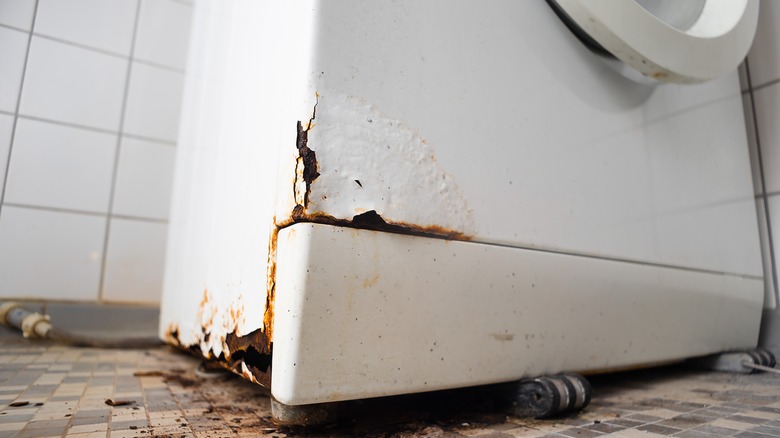The Common Household Product That Will Help Remove Rust From Your Washing Machine
When one of our appliances starts to go south or shows significant wear, it's not always possible to replace it with a sparkling new model. So caring for what we already have is a healthy and less expensive, if old-school, approach to maintenance. Washing machines are built to last a good long while, but by their very nature, torrents of water flow through them, creating damp conditions that can lead to rusting both inside and out. If your washing machine is still in working order but you've spotted even a hint of rust — run to the garage right now for the WD-40.
WD-40 was originally made as an anti-corrosive product for the aerospace industry, formulated specifically to keep rockets from getting rusty and crusty. But beyond rockets, it's an astonishingly versatile home aid too. This common household product will get rid of rust, restoring your washer to its former glory. And it's ready for action even if you haven't used it in a while because WD-40 won't expire when stored properly.
How to de-rust your washing machine
To keep your appliance in good shape, be alert to early hints that there's an interior rust problem — for instance tell-tale orangey-brown spots on your clothes that weren't there when you tossed them into the machine. What you'll need for this mission is a flashlight to locate the culprit, a can of WD-40 with its little red straw for targeted application, a utility sponge that has a scrubby side, and a smooth microfiber rag. First, make sure the washing machine is empty and dry. Then, take a clean rag and give the interior a thorough swipe to remove any dust or soap deposits.
Once you've found the rust spot(s), aim the red straw and apply the WD-40. Let it sit for at least ten minutes, then use the scrubby side of your sponge to remove the rust. As a final step, buff it clean with a microfiber cloth. You can follow the same procedure on the exterior of the machine. If you do see rust, we recommend you deal with it immediately because rust can spread, and may indicate that other parts are becoming corroded.
